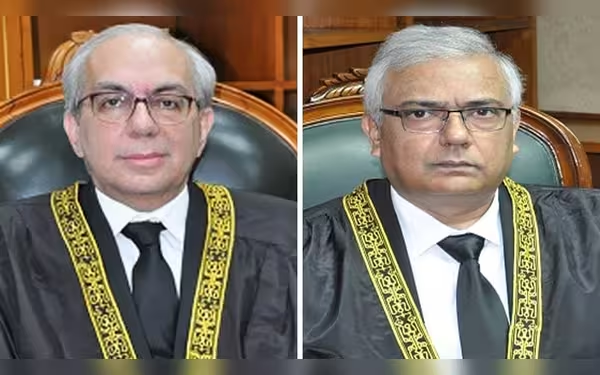Saturday, November 16, 2024 08:44 PM
CJP Isa Appoints Justice Amin to Supreme Court Judges' Committee
- CJP Isa replaces Justice Munib with Justice Amin.
- New ordinance enhances chief justice's appointment powers.
- Judges' committee crucial for Supreme Court's efficiency.
 Image Credits: thenews
Image Credits: thenewsCJP Isa replaces Justice Munib with Justice Amin in the Supreme Court judges' committee, enhancing judicial efficiency and transparency.
In a significant development within Pakistan's judicial system, Chief Justice of Pakistan (CJP) Qazi Faez Isa has made a pivotal change in the judges' committee of the Supreme Court. On Friday, he replaced Justice Munib Akhtar with Justice Amin-Ud-Din Khan, a move made possible by the Supreme Court (Practice and Procedure) Amendment Ordinance 2024, which was approved by President Asif Ali Zardari earlier that day. This ordinance is crucial as it enhances the powers of the chief justice, allowing for more flexibility in the appointment of committee members.
The judges' committee, which consists of three members, plays a vital role in determining the formation of Supreme Court benches and addressing cases related to human rights. The newly amended law empowers the CJP to nominate a judge to the committee in the event of a member's absence. This change is expected to streamline the decision-making process within the apex court, ensuring that cases are handled efficiently.
A notification from the registrar's office of the Supreme Court confirmed that Justice Mansoor Ali Shah remains a member of this important committee. Sources indicate that a session of the judges' committee is anticipated to be convened on Monday, which could lead to further developments in the court's operations.
The Supreme Court (Practice and Procedure) Act 2023, passed by the Pakistan Democratic Movement (PDM) during its final days in power, aimed to regulate the chief justice's powers. However, the implementation of this law faced challenges when an eight-member bench, led by then-CJP Umar Ata Bandial, issued a stay order on it before it could take effect. This law was designed to enhance transparency in the Supreme Court's proceedings and included provisions for the right to appeal.
According to the Act, every case presented before the Supreme Court must be heard by a bench formed by the committee, which includes the CJP and the two senior-most judges. Decisions made by this committee are to be determined by a majority vote. Additionally, any matter invoking Article 184(3) of the Constitution must first be reviewed by the committee, ensuring that significant constitutional interpretations are handled by a bench of no less than five judges.
Moreover, the Act stipulates that appeals against decisions made under Article 184(3) must be filed within 30 days and will be heard within a maximum of 14 days. This provision aims to expedite the judicial process, allowing parties to appoint their counsel of choice for review applications. Importantly, the law also allows for urgent applications to be heard within 14 days of filing.
However, it is noteworthy that the court has struck down the provision allowing retrospective appeal rights for individuals affected by orders made under Article 184(3) prior to the Act's commencement. This decision underscores the complexities and ongoing debates surrounding judicial reforms in Pakistan.
The recent changes in the Supreme Court's judges' committee reflect a broader effort to enhance the efficiency and transparency of Pakistan's judicial system. As the legal landscape continues to evolve, these developments will undoubtedly have lasting implications for the administration of justice in the country. The ability of the judiciary to adapt and respond to the needs of the public remains a critical factor in maintaining trust and integrity within the legal framework.













